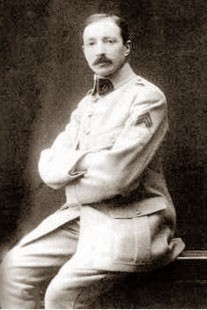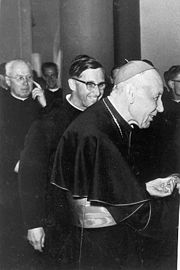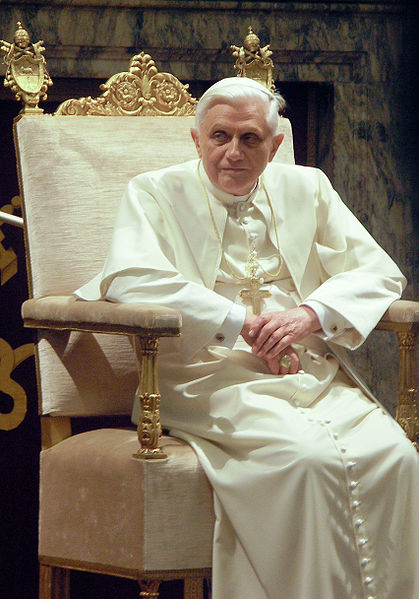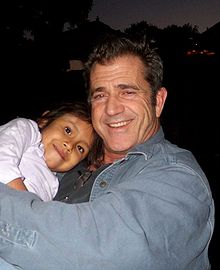Search our Archives:
» Home
» History
» Holidays
» Humor
» Places
» Thought
» Opinion & Society
» Writings
» Customs
» Misc.
|
Jules Isaac & Pope Benedict XVI
By Judith Rice
The Latin Nostra Aetate means “In Our Time.” Nostra Aetate was a declaration, with immense implications for Jews and other faiths, issued at the conclusion of Vatican II, December 8, 1965. The Catholic Church no longer held Jews collectively responsible for the death of Jesus.
This month, in our time, Jews will celebrate the single most defining event in Jewish life, the Passover. If it had not been for the Passover, the Jewish people would have remained an obscure tribe, forgotten to history, another slave group of the Egyptian pyramid building Pharaohs. If it had not been for the Passover celebration in Jerusalem two thousand years ago, the Passion of Jesus and the culmination of His life ending on the Cross would not have occurred. Christianity may have never come into being.
The Passover did occur. God took the Jews from Egypt to be a free people in the land that God had promised them, Israel. The annual Passover festival did occur again two thousand years ago when Jesus was crucified in Jerusalem; his death becoming central to the faith of billions of Christians. The Gospels are the eye witness accounts of Jesus’ Jewish followers. They told of the Jewish mob, led by the High Priest Caiaphas, who came before the Roman tribunal, Pontius Pilate. They demanded Jesus’ death. It was shortly before the Sabbath and the start of the Passover holiday.
Pilate weighed if he should free Jesus. He was uncertain of his guilt. “Pilate saw that he wasn't getting anywhere and that a riot was developing. So he sent for a bowl of water and washed his hands before the crowd, saying, "I am innocent of this man's blood. The responsibility is yours! And all the people yelled back, "We will take responsibility for his death--we and our children!" (Matthew 27:24-25).
For two thousand years the Churches, Catholic, Eastern, Coptic and others taught that the Jews were the murderers of God. They also taught that the Jews were the ones who killed Jesus; and had rejected Jesus. They taught that the Jews had rejected and lost the special relationship with God, to the church, the Jews were no longer the “Chosen People.” They taught that Christians and the Church were the Replacement in the relationship with God. This meant that the Jews would live accused, scourged and oppressed, as eternal witness and example to their perfidy, until Jesus would return at the end of times.
The Roman victory in the Jewish Wars that followed in the years after Jesus’ death destroyed the Holy Temple, Jerusalem and much of the Jewish people in Israel. Even the name of the land of Israel was wiped away and renamed Palestine by the Romans. To early Christians, the destruction was an affirmation of God’s rejection of the Jews. Christianity eventually became the religion of Rome and the Jews became the accursed of Rome because of the Church.
For two thousand years the Churches, Catholic, Eastern, Coptic and others, taught that the Jews were the murderers of God. They were the ones who killed Jesus. The Jews had rejected the Messiah Jesus. The Jews had rejected and lost the special relationship with God. They were no longer the “Chosen People.” Christians and the Church were the Replacement in the relationship with God. The Jews would live accused, scourged and oppressed, as eternal witness and example of their perfidy until Jesus would return at the end of times.
Jules Isaac
From the confusion of the immediate post war years, Jules Isaac, a Jew in name only but with the Yellow Star seared into his chest, searched for the source of the evil that murdered his wife and daughter in Auschwitz.
Jules Isaac was born in Rennes, France, November 18, 1877. His father was a French career military officer. He taught his family the love of France takes precedence over generations of Jewish beliefs. Jules’ Grandfather had fought for Napoleon at Waterloo. Jules’s father and his grandfather were both awarded the Legion of Honor, France’s highest military recognition.
Jules parents died before his 13th birthday. He was sent to school at Lakanal in Sceaux. As he grew into young adulthood, the Dreyfus affair burst over France with an enveloping, shocking darkness. Jules had become a founder of the Socialist Liberal journal “The Fortnight”. He dedicated himself to fight injustice. Isaac became a Drefussart, a supporter of Dreyfus. He supported Dreyfus not because of any Jewish religious or ethnic solidarity. He supported Dreyfus because of his deep passion for the liberating qualities of truth.

Jules Isaac
He became a history teacher in 1906 and was closely associated with the preeminent French publisher of France’s school history texts written by Albert Malet. Quickly, Isaac’s genius for making history readable and understandable became clear.
World War I sent him for 33 months into the trenches until he was wounded at Verdun. He came home and returned to education. He could have, as many did, let his private life become vengeful and bitter from the war. True to the idealistic traditions of the French Republican Left, he became a member of the League of Human Rights and the Vigilance Committee of Antifascist Intellectuals. He devoted his extensive talents to foster better understanding between France and Germany. He desired a tomorrow of peace between France and Germany. His particular focus wasthe textbooks of French students. He did not want young minds poisoned with hatred. In 1936 he was appointed the Superintendent of Public Instruction in France.
Isaac insisted that French school textbooks clear the tangle of jumbled historical events. He brought students into contact with the original source materials. Students could read for themselves and discover the truth.
The fall of France to the Nazis, at the beginning of WWII, was bitter for all Frenchmen. For Isaac, the Act of October 3, 1940 began a series of discriminatory laws against Jews. Three years later, October 7, 1943, the day before Yom Kippur, his wife and daughter were arrested. Isaac protested their arrests. He appealed to the Nazi government. He had been one of those who never sought war with Germany. He pleaded that he had in fact been one of the principal historians who wanted understanding and peace with Germany. Isaac was only able to save himself, not his wife and daughter. They were murdered in Auschwitz.
The war ended. Jules Isaac was reinstated, at least honorarily, as the Superintendent of Public Education. The war had changed many people and it changed Jules Isaac. He no longer was focused with promoting understanding and rapprochement between France and Germany. He wanted to know the historical why. What could have caused people, French, German and others, to become so anti-Semitic that only a blood lust would satiate them? His immense historical skills turned to a study of the roots and causes of anti-Semitism.
Two years later, 1947, he became the co-founder of the Judeo-Christian Friendship League. The same year his first major work, Jesus and Israel, appeared. It was a 600 page, academic examination of the roots of anti-Semitism. He traced anti-Semitism’s origins back to misinterpretations of the foundational texts of Christianity – the Gospels.
Ever the educator and seeker of truth, he published his conclusions as eighteen recommendations for Christian education. For Isaac, the truth, stripped of millenniums of grimy history and distortion, would make Jews and Christians free. Anti-Semitism, he believed would end.
- Give all Christians a basic knowledge of the Old Testament and its Jewish origins.
- Explain that much of Christian liturgy drew its foundations from the Old Testament.
- Do not omit that God had first revealed himself through the Old Testament to the Jews and later to the Christians
- Judaism is not a degenerative faith. Christianity was born of it.
- The myth of Jewish historical dispersion, because of death of Jesus, is wrong. The Jews had been largely dispersed from Israel for almost 500 years before Jesus.
- The Gospels text use of the word Jews is too broad in its context. The Jews of Jesus’ experience were limited to the Temple Jews and a small crowd before Pilate. The misreading of the Gospels blankets all Jews, everywhere, equally and erroneously.
- Jesus was a Jew.
- Jesus lived as a Jew.
- Jesus recruited his Apostles from the Jews.
- Jesus, throughout his ministry, only sought to gather adherents from the Jews.
- Do not teach that Jesus was rejected by the Jews, before and during his trial and crucifixion, because the vast majority of the Jews had no knowledge of Jesus.
- Jesus was not universally rejected by the Jewish leadership. The Gospels recognize he was rejected by a section of the Priests who were not unanimous against Jesus.
- There is nothing in the Gospels of a universal condemnation of the Jews.
- Be aware of the false charge of Deicide.
- The Gospels make clear that the High Priest and his supporters acted without the knowledge of the people.
- The trial of Jesus was a Roman trial, not a Jewish trial. The Jewish people, as a whole, did not even know of the trial or its brutalities.
- The procurator of the Roman trial was Pontius Pilate, with full control over life and death, not the Jews. The fourth Gospel acknowledges that the accusation and the trial involved the High Priest and his supporters alone.
- The accusation, “His blood be on us and our children,” cannot balance against Jesus’ words of forgiveness on the Cross – “Father, forgive them for they know not what they do.”
The world was slowly, painfully if not reluctantly, becoming aware of the Holocaust. Humanity asked, how did it happen. In 1949, Pope Pius XII authorized that the Good Friday prayer for the Jews be changed. The incendiary words “perfidies Judaeis”, perfidious Jews, were dropped and the much milder “unfaithful or unbelieving” substituted. Shortly afterwards, Professor Isaac had an audience with Pope Pius XII. He presented his eighteen points. Nothing further developed.
Jules Isaac’s international reputation continued growing. In the 1950s, his most influential work about the Church and Jewish relations was published. It was a small book with an enormous title – The Teaching of Contempt. Isaac’s views never changed. His desire to open the source material to all people and let them read it themselves would be the road to truth and common humanity. He was very critical in his book of how the Church taught faith and its relationship to the Holocaust.
The Popes' Involvement
Pope John XXIII
Pope Pius XII died in 1958. He was succeeded by Pope John XXIII. Pope John XXIII was perhaps the most extraordinary Pope in the history of Christian- Jewish relations. During WWII, as Cardinal Angelo Roncalii, he knew of the terrors of the Holocaust. He did not sit by. He acted. He acted to the full extent of his abilities for the Jews, He provided sanctuary, false baptismal papers, and transportation to Palestine. He personally morally recriminated and chastised Nazi Diplomats, who were Catholics. Most significantly, he worked closely with the Bulgarian King to try and save an estimated 100,000 Jews.
Jules Isaac met with Pope John XXIII in a private meeting, 1960. Isaac shared with the Pope his views and understanding of how the teaching of theology was linked to the development of anti-Semitism and the Holocaust. Pope John XXIII knew and understood that the Church, in the backward looking mirror of an accusatory post Holocaust world, was in serious need of reform. His first act was to convene Vatican II, a Church Council to examine and offer reforms for the Church and its policies.
A special mandate of the Pope for Vatican II was to examine the Church’s relationship to non-Catholics. Pope John XXIII assigned the question over Catholic-Jewish issues for Vatican II to Cardinal Augustin Bea. Augustin Bea was a German, born near Baden-Wurttemberg. At one time Cardinal Bea was the confessor to Pius XII. Cardinal Bea was a much respected scholar of Biblical studies and Biblical archeology. He was a member of numerous ecumenical bodies and author of nine books, most notably, The Church and the Jewish People, 1966. Pope John XXIII raised him to a Cardinal in 1959.

Cardinal Augustin Bea
During the struggles within Vatican II, Cardinal Bea was a decisive force in the drafting of Nostra Aetate, which repudiated ante-Semitism. John Borelli, a Vatican II historian observed that “it took the will of John XXIII and the perseverance of Cardinal Bea to impose the declaration on the council.”
The Pope could not simply impose his will on Vatican II. It was a political process involving 2200 prelates, hundreds of meetings, political maneuverings between conservative and liberal wings of the Church for theological dominance and control of the future of Catholicism. Vatican II was a religious experience and a contentious one. Emotions, feelings and bitterness rose to the heights as did hopes for the future of the Church. Enemies of the Nostra Aetate accused Cardinal Bea of being a secret Jew. His name in Germany had possible Jewish roots.
Pope John XXIII died in the spring of 1963. Vatican II had been convened in 1962. He never lived to see the results of what he had started. Pope John XXIII was succeeded by Pope Paul VI. Pope Paul ably continued steering the course that his predecessor had begun despite being bitterly criticized for giving in to the politics of Holocaust guilt. With input from noted Jewish Rabbinic leaders, such as liberal Rabbi Abraham Joshua Heschel, and bitter opposition from Orthodox Rabbis such as Rabbi Joseph Soloveitchik who saw Catholic attempts at ecumenism as a backdoor method to Jewish conversion, Vatican II issued its results December, 1965.
Nostra Aetate declared the Catholic Church’s views on relations with non-Catholics, Hindus, Buddhists, Muslims, Jews and others. It was the shortest of the three documents that Vatican II issued. Nostra Aetate is made up of five sections. Hindus and Buddhists as well as other paths to God were acknowledged. “The Catholic Church rejects nothing that is true and holy in these religions” the declaration said. The document continues, “The Church regards with esteem also the Moslems.” Section four is the longest and addresses the Church and Jewish relations.
4. As the sacred synod searches into the mystery of the Church, it remembers the bond that spiritually ties the people of the New Covenant to Abraham's stock.
Thus the Church of Christ acknowledges that, according to God's saving design, the beginnings of her faith and her election are found already among the Patriarchs, Moses and the prophets. She professes that all who believe in Christ-Abraham's sons according to faith (6)-are included in the same Patriarch's call, and likewise that the salvation of the Church is mysteriously foreshadowed by the chosen people's exodus from the land of bondage. The Church, therefore, cannot forget that she received the revelation of the Old Testament through the people with whom God in His inexpressible mercy concluded the Ancient Covenant. Nor can she forget that she draws sustenance from the root of that well-cultivated olive tree onto which have been grafted the wild shoots, the Gentiles.(7) Indeed, the Church believes that by His Cross Christ, Our Peace, reconciled Jews and Gentiles. making both one in Himself.(8)
The Church keeps ever in mind the words of the Apostle about his kinsmen: "theirs is the sonship and the glory and the covenants and the law and the worship and the promises; theirs are the fathers and from them is the Christ according to the flesh" (Rom. 9:4-5), the Son of the Virgin Mary. She also recalls that the Apostles, the Church's main-stay and pillars, as well as most of the early disciples who proclaimed Christ's Gospel to the world, sprang from the Jewish people.
As Holy Scripture testifies, Jerusalem did not recognize the time of her visitation,(9) nor did the Jews in large number, accept the Gospel; indeed not a few opposed its spreading.(10) Nevertheless, God holds the Jews most dear for the sake of their Fathers; He does not repent of the gifts He makes or of the calls He issues-such is the witness of the Apostle.(11) In company with the Prophets and the same Apostle, the Church awaits that day, known to God alone, on which all peoples will address the Lord in a single voice and "serve him shoulder to shoulder" (Soph. 3:9).(12)
Since the spiritual patrimony common to Christians and Jews is thus so great, this sacred synod wants to foster and recommend that mutual understanding and respect which is the fruit, above all, of biblical and theological studies as well as of fraternal dialogues.
True, the Jewish authorities and those who followed their lead pressed for the death of Christ;(13) still, what happened in His passion cannot be charged against all the Jews, without distinction, then alive, nor against the Jews of today. Although the Church is the new people of God, the Jews should not be presented as rejected or accursed by God, as if this followed from the Holy Scriptures. All should see to it, then, that in catechetical work or in the preaching of the word of God they do not teach anything that does not conform to the truth of the Gospel and the spirit of Christ.
Furthermore, in her rejection of every persecution against any man, the Church, mindful of the patrimony she shares with the Jews and moved not by political reasons but by the Gospel's spiritual love, decries hatred, persecutions, displays of anti-Semitism, directed against Jews at any time and by anyone.
Besides, as the Church has always held and holds now, Christ underwent His passion and death freely, because of the sins of men and out of infinite love, in order that all may reach salvation. It is, therefore, the burden of the Church's preaching to proclaim the Cross of Christ as the sign of God's all-embracing love and as the fountain from which every grace flows.”
Jules Isaac died September 6, 1963, yet the voice of this non-observant Jew could be heard echoing in the final form of Nostra Aetate. He, like Pope John XXIII, never lived to see the Nostra Aetate issued. The declaration was not all he nor what all Pope John XXIII, had hoped it would be. It was a compromise.
The Impact of Nostra Aetate
For the first time, after 2,000 years of torment, magnified by theological misinterpretation and misdirection, the Jews were no longer, as a whole, then or today, declared responsible for the death of Jesus.

Pope Benedict XVI
The issuance of Nostra Aetate did not mean that the entire Church suddenly changed and accepted its extraordinary theological direction. It began a process that has been continued and built upon by Pope John Paul II and Pope Benedict XVI. Elements within the Church are resistive to the changes. The document is viewed by some within the Church as controversial. In parts of Eastern Europe, Poland and other conservative Catholic lands, the teaching that the Jews killed Jesus persists. Popular culture figures, like Mel Gibson, through his film The Passion of The Christ, still promote the claim that the Jews are responsible for killing Jesus. Mel Gibson is a member of a very conservative branch of the Catholic Church that does not accept the irrefutable authority of the Pope. Gibson is regarded by the Church as a Catholic in good standing.

Mel Gibson
What was started by Nostra Aetate is a process of change, not a guarantee of change. It has been continued by every single Pope since its issuance. Each Pope faces his own challenges to leadership, theological control and political struggles from within. The election of Pope Benedict XVI was greeted with warmth by the Jews and then with dismay when he welcomed back into the Church Cardinals who had been, and continued to be, Holocaust deniers.
In his recently released book, March 2011, Jesus of Nazareth, Part Two, Pope Benedict XVI wrote about Jesus’ Passion. The vision of Nostra Aetate is presented and advocated for in his own words. Now passed for 47 years, Jules Isaac too is heard. He is heard in the pages, in the background, calling for reason and understanding.
Pope Benedict wrote, “When in Matthew’s account the “whole people” say: “His blood be on us and on our children,” the Christian will remember Jesus’ blood speaks a different language from the blood of Abel. It does not cry out for vengeance and punishment; it brings reconciliation. It is not poured out against anyone; it is poured out for many, for all.
….Just as Caiaphas’ words about the need for Jesus’ death have to be read in an entirely new light from the perspective of faith, the same applies to Matthew’s reference to blood: …These words are not a curse but rather redemption, salvation. Only when understood in terms of the theology of the Last Supper and the Cross drawn from the whole of the New Testament does this verse from Matthew’s Gospel take on its correct meaning.”
From Prime Minister Netanyahu, to Jewish communities around the world, the Pope’s furtherance of the meaning of Nostra Aetate brings hope for the future this Passover and the next and the next.
* * * * *
Judith Rice is a board member of the American Zionist Historical Society
She can be reached at amzhs@hotmail.com
~~~~~~~
from the April 2011 Passover Edition of the Jewish Magazine
|
|
Please let us know if you see something unsavory on the Google Ads and we will have them removed. Email us with the offensive URL (www.something.com)
|





|
